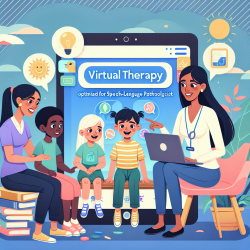Embracing the Virtual Therapy Revolution
The digital age has transformed numerous sectors, and the field of speech language pathology is no exception. As professionals committed to creating the best outcomes for children, we must consider the potential of virtual therapy. By leveraging technology, we can enhance the accessibility and effectiveness of our services, especially for kids in special education.
Data-Driven Decisions in Virtual Therapy
Making informed decisions based on empirical evidence is crucial in our practice. Research has shown that virtual therapy can be as effective as traditional face-to-face sessions, with studies indicating significant improvements in communication skills among children who receive online therapy. These findings are supported by data from various randomized controlled trials, underscoring the efficacy of virtual therapy in improving speech and language outcomes.
Benefits of Virtual Therapy for Kids
There are several compelling advantages to utilizing virtual therapy:
- Accessibility: Virtual therapy eliminates geographical barriers, making it possible for children in remote or underserved areas to receive high-quality speech therapy services.
- Convenience: Families can schedule sessions at times that are most convenient for them, reducing the need for travel and minimizing disruptions to daily routines.
- Engagement: Interactive digital tools can enhance engagement, making therapy sessions more appealing and enjoyable for kids.
Overcoming Challenges
While virtual therapy offers numerous benefits, it also presents challenges that need to be addressed:
- Technology Access: Ensuring that families have the necessary technology and internet connectivity is essential for successful virtual therapy sessions.
- Privacy Concerns: Maintaining confidentiality and safeguarding personal information is paramount. It's important to use secure platforms that comply with relevant regulations.
- Training: Speech language pathologists must be adequately trained to deliver effective virtual therapy. This includes understanding how to use digital tools and adapt traditional therapy techniques to an online format.
Taking the Next Step
As speech language pathologists, it is our responsibility to stay informed about the latest advancements in our field. Virtual therapy is not just a trend; it is a powerful tool that can significantly enhance our practice and improve outcomes for children, especially those in special education.
Consider exploring online therapy platforms like TinyEYE, which offer comprehensive solutions designed specifically for speech language pathologists. By embracing virtual therapy, you can expand your reach, provide flexible and effective services, and ultimately make a greater impact in the lives of the children you serve.










